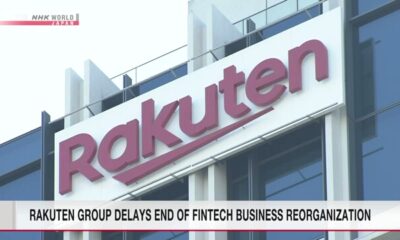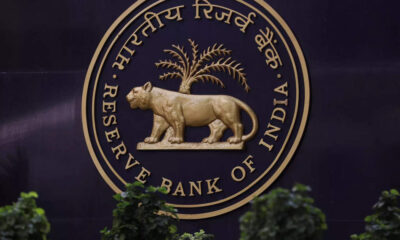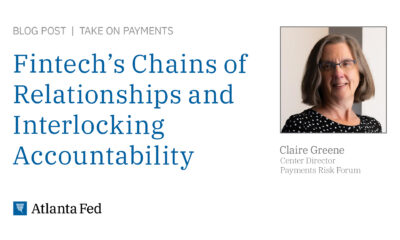Fintech
Americans caught in fintech’s false FDIC promise

When Natasha Craft first got a Yotta banking account in 2021, she loved using it so much she told her friends to sign up.
The app made saving money fun and easy, and Craft, a now 25-year-old FedEx driver from Mishawaka, Indiana, was busy getting her financial life in order and planning a wedding. Craft had her wages deposited directly into a Yotta account and used the startup’s debit card to pay for all her expenses.
The app — which gamifies personal finance with weekly sweepstakes and other flashy features — even occasionally covered some of her transactions.
“There were times I would go buy something and get that purchase for free,” Craft told CNBC.
Today, her entire life savings — $7,006 — is locked up in a complicated dispute playing out in bankruptcy court, online forums like Reddit and regulatory channels. And Yotta, an array of other startups and their banks have been caught in a moment of reckoning for the fintech industry.
For customers, fintech promised the best of both worlds: The innovation, ease of use and fun of the newest apps combined with the safety of government-backed accounts held at real banks.
The startups prominently displayed protections afforded by the Federal Deposit Insurance Corp., lending credibility to their novel offerings. After all, since its 1934 inception, no depositor “has ever lost a penny of FDIC-insured deposits,” according to the agency’s website.
But the widening fallout over the collapse of a fintech middleman called Synapse has revealed that promise of safety as a mirage.
Starting May 11, more than 100,000 Americans with $265 million in deposits were locked out of their accounts. Roughly 85,000 of those customers were at Yotta alone, according to the startup’s co-founder, Adam Moelis.
CNBC reached out to fintech customers whose lives have been upended by the Synapse debacle.
They come from all walks and stages of life, from Craft, the Indiana FedEx driver; to the owner of a chain of preschools in Oakland, California; a talent analyst for Disney living in New York City; and a computer engineer in Santa Barbara, California. A high school teacher in Maryland. A parent in Bristol, Connecticut, who opened an account for his daughter. A social worker in Seattle saving up for dental work after Adderall abuse ruined her teeth.
‘A reckoning underway’
Since Yotta, like most popular fintech apps, wasn’t itself a bank, it relied on partner institutions including Tennessee-based Evolve Bank & Trust to offer checking accounts and debit cards. In between Yotta and Evolve was a crucial middleman, Synapse, keeping track of balances and monitoring fraud.
Founded in 2014 by a first-time entrepreneur named Sankaet Pathak, Synapse was a player in the “banking-as-a-service” segment alongside companies like Unit and Synctera. Synapse helped customer-facing startups like Yotta quickly access the rails of the regulated banking industry.
It had contracts with 100 fintech companies and 10 million end users, according to an April court filing.
Until recently, the BaaS model was a growth engine that seemed to benefit everybody. Instead of spending years and millions of dollars trying to acquire or become banks, startups got quick access to essential services they needed to offer. The small banks that catered to them got a source of deposits in a time dominated by giants like JPMorgan Chase.
But in May, Synapse, in the throes of bankruptcy, turned off a critical system that Yotta’s bank used to process transactions. In doing so, it threw thousands of Americans into financial limbo, and a growing segment of the fintech industry into turmoil.
“There is a reckoning underway that involves questions about the banking-as-a-service model,” said Michele Alt, a former lawyer for the Office of the Comptroller of the Currency and a current partner at consulting firm Klaros Group. She believes the Synapse failure will prove to be an “aberration,” she added.
The most popular finance apps in the country, including Block’s Cash App, PayPal and Chime, partner with banks instead of owning them. They account for 60% of all new fintech account openings, according to data provider Curinos. Block and PayPal are publicly traded; Chime is expected to launch an IPO next year.
Block, PayPal and Chime didn’t provide comment for this article.
‘Deal directly with a bank’
While industry experts say those firms have far more robust ledgering and daily reconciliation abilities than Synapse, they may still be riskier than direct bank relationships, especially for those relying on them as a primary account.
“If it’s your spending money, you need to be dealing directly with a bank,” Scott Sanborn, CEO of LendingClub, told CNBC. “Otherwise, how do you, as a consumer, know if the conditions are met to get FDIC coverage?”
Sanborn knows both sides of the fintech divide: LendingClub started as a fintech lender that partnered with banks until it bought Boston-based Radius in early 2020 for $185 million, eventually becoming a fully regulated bank.
Scott Sanborn, LendingClub CEO
Getty Images
Sanborn said acquiring Radius Bank opened his eyes to the risks of the “banking-as-a-service” space. Regulators focus not on Synapse and other middlemen, but on the banks they partner with, expecting them to monitor risks and prevent fraud and money laundering, he said.
But many of the tiny banks running BaaS businesses like Radius simply don’t have the personnel or resources to do the job properly, Sanborn said. He shuttered most of the lender’s fintech business as soon as he could, he says.
“We are one of those people who said, ‘Something bad is going to happen,'” Sanborn said.
A spokeswoman for the Financial Technology Association, a Washington, D.C.-based trade group representing large players including Block, PayPal and Chime, said in a statement that it is “inaccurate to claim that banks are the only trusted actors in financial services.”
“Consumers and small businesses trust fintech companies to better meet their needs and provide more accessible, affordable, and secure services than incumbent providers,” the spokeswoman said.
“Established fintech companies are well-regulated and work with partner banks to build strong compliance programs that protect consumer funds,” she said. Furthermore, regulators ought to take a “risk-based approach” to supervising fintech-bank partnerships, she added.
The implications of the Synapse disaster may be far-reaching. Regulators have already been moving to punish the banks that provide services to fintechs, and that will undoubtedly continue. Evolve itself was reprimanded by the Federal Reserve last month for failing to properly manage its fintech partnerships.
In a post-Synapse update, the FDIC made it clear that the failure of nonbanks won’t trigger FDIC insurance, and that even when fintechs partner with banks, customers may not have their deposits covered.
The FDIC’s exact language about whether fintech customers are eligible for coverage: “The short answer is: it depends.”
FDIC safety net
While their circumstances all differed vastly, each of the customers CNBC spoke to for this story had one thing in common: They thought the FDIC backing of Evolve meant that their funds were safe.
“For us, it just felt like they were a bank,” the Oakland preschool owner said of her fintech provider, a tuition processor called Curacubby. “You’d tell them what to bill, they bill it. They’d communicate with parents, and we get the money.”
The 62-year-old business owner, who asked CNBC to withhold her name because she didn’t want to alarm employees and parents of her schools, said she’s taken out loans and tapped credit lines after $236,287 in tuition was frozen in May.
Now, the prospect of selling her business and retiring in a few years seems much further out.
“I’m assuming I probably won’t see that money,” she said, “And if I do, how long is it going to take?”
When Rick Davies, a 46-year-old lead engineer for a men’s clothing company that owns online brands including Taylor Stitch, signed up for an account with crypto app Juno, he says he “distinctly remembers” being comforted by seeing the FDIC logo of Evolve.
“It was front and center on their website,” Davies said. “They made it clear that it was Evolve doing the banking, which I knew as a fintech provider. The whole package seemed legit to me.”
He’s now had roughly $10,000 frozen for weeks, and says he’s become enraged that the FDIC hasn’t helped customers yet.
For Davies, the situation is even more baffling after regulators swiftly took action to seize Silicon Valley Bank last year, protecting uninsured depositors including tech investors and wealthy families in the process. His employer banked with SVB, which collapsed after clients withdrew deposits en masse, so he saw how fast action by regulators can head off distress.
“The dichotomy between the FDIC stepping in extremely quickly for San Francisco-based tech companies and their impotence in the face of this similar, more consumer-oriented situation is infuriating,” Davies said.
The key difference with SVB is that none of the banks linked with Synapse have failed, and because of that, the regulator hasn’t moved to help impacted users.
Consumers can be forgiven for not understanding the nuance of FDIC protection, said Alt, the former OCC lawyer.
“What consumers understood was, ‘This is as safe as money in the bank,'” Alt said. “But the FDIC insurance isn’t a pot of money to generally make people whole, it is there to make depositors of a failed bank whole.”
Waiting for their money
For the customers involved in the Synapse mess, the worst-case scenario is playing out.
While some customers have had funds released in recent weeks, most are still waiting. Those later in line may never see a full payout: There is a shortfall of up to $96 million in funds that are owed to customers, according to the court-appointed bankruptcy trustee.
That’s because of Synapse’s shoddy ledgers and its system of pooling users’ money across a network of banks in ways that make it difficult to reconstruct who is owed what, according to court filings.
The situation is so tangled that Jelena McWilliams, a former FDIC chairman now acting as trustee over the Synapse bankruptcy, has said that finding all the customer money may be impossible.
Despite weeks of work, there appears to be little progress toward fixing the hardest part of the Synapse mess: Users whose funds were pooled in “for benefit of,” or FBO, accounts. The technique has been used by brokerages for decades to give wealth management customers FDIC coverage on their cash, but its use in fintech is more novel.
“If it’s in an FBO account, you don’t even know who the end customer is, you just have this giant account,” said LendingClub’s Sanborn. “You’re trusting the fintech to do the work.”
While McWilliams has floated a partial payment to end users weeks ago, an idea that has support from Yotta co-founder Moelis and others, that hasn’t happened yet. Getting consensus from the banks has proven difficult, and the bankruptcy judge has openly mused about which regulator or body of government can force them to act.
The case is “uncharted territory,” Judge Martin Barash said, and because depositors’ funds aren’t the property of the Synapse estate, Barash said it wasn’t clear what his court could do.
Evolve has said in filings that it has “great pause” about making any payments until a full reconciliation happens. It has further said that Synapse ledgers show that nearly all of the deposits held for Yotta were missing, while Synapse has said that Evolve holds the funds.
“I don’t know who’s right or who’s wrong,” Moelis told CNBC. “We know how much money came into the system, and we are certain that that’s the correct number. The money doesn’t just disappear; it has to be somewhere.”
In the meantime, the former Synapse CEO and Evolve have had an eventful few weeks.
Pathak, who dialed into early bankruptcy hearings while in Santorini, Greece, has since been attempting to raise funds for a new robotics startup, using marketing materials with misleading claims about its ties with automaker General Motors.
And only days after being censured by the Federal Reserve about its management of technology partners, Evolve was attacked by Russian hackers who posted user data from an array of fintech firms, including Social Security numbers, to a dark web forum for criminals.
Natasha Craft, a 25-year-old FedEx driver from Mishawaka, Indiana. She has been locked out of her Yotta banking account since May 11.
Courtesy: Natasha Craft
For customers, it’s mostly been a waiting game.
Craft, the Indiana FexEx driver, said she had to borrow money from her mother and grandmother for expenses. She worries about how she’ll pay for catering at her upcoming wedding.
“We were led to believe that our money was FDIC-insured at Yotta, as it was plastered all over the website,” Craft said. “Finding out that what FDIC really means, that was the biggest punch to the gut.”
She now has an account at Chase, the largest and most profitable American bank in history.
— With contributions from CNBC’s Gabriel Cortes.
Fintech
US Agencies Request Information on Bank-Fintech Dealings

Federal banking regulators have issued a statement reminding banks of the potential risks associated with third-party arrangements to provide bank deposit products and services.
The agencies support responsible innovation and banks that engage in these arrangements in a safe and fair manner and in compliance with applicable law. While these arrangements may offer benefits, supervisory experience has identified a number of safety and soundness, compliance, and consumer concerns with the management of these arrangements. The statement details potential risks and provides examples of effective risk management practices for these arrangements. Additionally, the statement reminds banks of existing legal requirements, guidance, and related resources and provides insights that the agencies have gained through their oversight. The statement does not establish new supervisory expectations.
Separately, the agencies requested additional information on a broad range of arrangements between banks and fintechs, including for deposit, payment, and lending products and services. The agencies are seeking input on the nature and implications of arrangements between banks and fintechs and effective risk management practices.
The agencies are considering whether to take additional steps to ensure that banks effectively manage the risks associated with these different types of arrangements.
SUBSCRIBE TO THE NEWSLETTER
And get exclusive articles on the stock markets
Fintech
What changes in financial regulation have impacted the development of financial technology?

Exploring the complex landscape of global financial regulation, we gather insights from leading fintech leaders, including CEOs and finance experts. From the game-changing impact of PSD2 to the significant role of GDPR in data security, explore the four key regulatory changes that have reshaped fintech development, answering the question: “What changes in financial regulation have impacted fintech development?”
- PSD2 revolutionizes access to financial technology
- GDPR Improves Fintech Data Privacy
- Regulatory Sandboxes Drive Fintech Innovation
- GDPR Impacts Fintech Data Security
PSD2 revolutionizes access to financial technology
When it comes to regulatory impact on fintech development, nothing comes close to PSD2. This EU regulation has created a new level playing field for market players of all sizes, from fintech startups to established banks. It has had a ripple effect on other markets around the world, inspiring similar regulatory frameworks and driving global innovation in fintech.
The Payment Services Directive (PSD2), the EU law in force since 2018, has revolutionized the fintech industry by requiring banks to provide third-party payment providers (TPPs) with access to payment services and customer account information via open APIs. This has democratized access to financial data, fostering the development of personalized financial instruments and seamless payment solutions. Advanced security measures such as Strong Customer Authentication (SCA) have increased consumer trust, pushing both fintech companies and traditional banks to innovate and collaborate more effectively, resulting in a dynamic and consumer-friendly financial ecosystem.
The impact of PSD2 has extended beyond the EU, inspiring similar regulations around the world. Countries such as the UK, Australia and Canada have launched their own open banking initiatives, spurred by the benefits seen in the EU. PSD2 has highlighted the benefits of open banking, also prompting US financial institutions and fintech companies to explore similar initiatives voluntarily.
This has led to a global wave of fintech innovation, with financial institutions and fintech companies offering more integrated, personalized and secure services. The EU’s leadership in open banking through PSD2 has set a global standard, promoting regulatory harmonization and fostering an interconnected and innovative global financial ecosystem.
Looking ahead, the EU’s PSD3 proposals and Financial Data Access (FIDA) regulations promise to further advance open banking. PSD3 aims to refine and build on PSD2, with a focus on improving transaction security, fraud prevention, and integration between banks and TPPs. FIDA will expand data sharing beyond payment accounts to include areas such as insurance and investments, paving the way for more comprehensive financial products and services.
These developments are set to further enhance connectivity, efficiency and innovation in financial services, cementing open banking as a key component of the global financial infrastructure.
General Manager, Technology and Product Consultant Fintech, Insurtech, Miquido
GDPR Improves Fintech Data Privacy
Privacy and data protection have been taken to another level by the General Data Protection Regulation (GDPR), forcing fintech companies to tighten their data management. In compliance with the GDPR, organizations must ensure that personal data is processed fairly, transparently, and securely.
This has led to increased innovation in fintech towards technologies such as encryption and anonymization for data protection. GDPR was described as a top priority in the data protection strategies of 92% of US-based companies surveyed by PwC.
Financial Expert, Sterlinx Global
Regulatory Sandboxes Drive Fintech Innovation
Since the UK’s Financial Conduct Authority (FCA) pioneered sandbox regulatory frameworks in 2016 to enable fintech startups to explore new products and services, similar frameworks have been introduced in other countries.
This has reduced the “crippling effect on innovation” caused by a “one size fits all” regulatory approach, which would also require machines to be built to complete regulatory compliance before any testing. Successful applications within sandboxes give regulators the confidence to move forward and address gaps in laws, regulations, or supervisory approaches. This has led to widespread adoption of new technologies and business models and helped channel private sector dynamism, while keeping consumers protected and imposing appropriate regulatory requirements.
Co-founder, UK Linkology
GDPR Impacts Fintech Data Security
A big change in financial regulations that has had a real impact on fintech is the 2018 EU General Data Protection Regulation (GDPR). I have seen how GDPR has pushed us to focus more on user privacy and data security.
GDPR means we have to handle personal data much more carefully. At Leverage, we have had to step up our game to meet these new rules. We have improved our data encryption and started doing regular security audits. It was a little tricky at first, but it has made our systems much more secure.
For example, we’ve added features that give users more control over their data, like simple consent tools and clear privacy notices. These changes have helped us comply with GDPR and made our customers feel more confident in how we handle their information.
I believe that GDPR has made fintech companies, including us at Leverage, more transparent and secure. It has helped build trust with our users, showing them that we take data protection seriously.
CEO & Co-Founder, Leverage Planning
Related Articles
Fintech
M2P Fintech About to Raise $80M

Application Programming Interface (API) Infrastructure Platform M2P Financial Technology has reached the final round to raise $80 million, at a valuation of $900 million.
Specifically, M2P Fintech, formerly known as Yap, is closing a new funding round involving new and existing investors, according to entrackr.com. The India-based company, which last raised funding two and a half years ago, previously secured $56 million in a round led by Insight Partners, earning a post-money valuation of $650 million.
A source indicated that M2P Fintech is ready to raise $80 million in this new funding round, led by a new investor. Existing backers, including Insight Partners, are also expected to participate. The new funding is expected to go toward enhancing the company’s technology infrastructure and driving growth in domestic and international markets.
What does M2P Fintech do?
M2P Fintech’s API platform enables businesses to provide branded financial services through partnerships with fintech companies while maintaining regulatory compliance. In addition to its operations in India, the company is active in Nepal, UAE, Australia, New Zealand, Philippines, Bahrain, Egypt, and many other countries.
Another source revealed that M2P Fintech’s valuation in this funding round is expected to be between USD 880 million and USD 900 million (post-money). The company has reportedly received a term sheet and the deal is expected to be publicly announced soon. The Tiger Global-backed company has acquired six companies to date, including Goals101, Syntizen, and BSG ITSOFT, to enhance its service offerings.
According to TheKredible, Beenext is the company’s largest shareholder with over 13% ownership, while the co-founders collectively own 34% of the company. Although M2P Fintech has yet to release its FY24 financials, it has reported a significant increase in operating revenue. However, this growth has also been accompanied by a substantial increase in losses.
Fintech
Scottish financial technology firm Aveni secures £11m to expand AI offering

By Gloria Methri
Today
- To come
- Aveni Assistance
- Aveni Detection
Artificial intelligence Financial Technology Aveni has announced one of the largest Series A investments in a Scottish company this year, amounting to £11 million. The investment is led by Puma Private Equity with participation from Par Equity, Lloyds Banking Group and Nationwide.
Aveni combines AI expertise with extensive financial services experience to create large language models (LLMs) and AI products designed specifically for the financial services industry. It is trusted by some of the UK’s leading financial services firms. It has seen significant business growth over the past two years through its conformity and productivity solutions, Aveni Detect and Aveni Assist.
This investment will enable Aveni to build on the success of its existing products, further consolidate its presence in the sector and introduce advanced technologies through FinLLM, a large-scale language model specifically for financial services.
FinLLM is being developed in partnership with new investors Lloyds Banking Group and Nationwide. It is a large, industry-aligned language model that aims to set the standard for transparent, responsible and ethical adoption of generative AI in UK financial services.
Following the investment, the team developing the FinLLM will be based at the Edinburgh Futures Institute, in a state-of-the-art facility.
Joseph Twigg, CEO of Aveniexplained, “The financial services industry doesn’t need AI models that can quote Shakespeare; it needs AI models that deliver transparency, trust, and most importantly, fairness. The way to achieve this is to develop small, highly tuned language models, trained on financial services data, and reviewed by financial services experts for specific financial services use cases. Generative AI is the most significant technological evolution of our generation, and we are in the early stages of adoption. This represents a significant opportunity for Aveni and our partners. The goal with FinLLM is to set a new standard for the controlled, responsible, and ethical adoption of generative AI, outperforming all other generic models in our select financial services use cases.”
Previous Article
Network International and Biz2X Sign Partnership for SME Financing
IBSi Daily News Analysis

SMBs Leverage Cloud to Gain Competitive Advantage, Study Shows
IBSi FinTech Magazine

- The Most Trusted FinTech Magazine Since 1991
- Digital monthly issue
- Over 60 pages of research, analysis, interviews, opinions and rankings
- Global coverage
subscribe now
-

 DeFi12 months ago
DeFi12 months agoDeFi Technologies Appoints Andrew Forson to Board of Directors
-

 Fintech12 months ago
Fintech12 months agoUS Agencies Request Information on Bank-Fintech Dealings
-

 News1 year ago
News1 year agoBlock Investors Need More to Assess Crypto Unit’s Earnings Potential, Analysts Say — TradingView News
-

 DeFi12 months ago
DeFi12 months agoSwitchboard Revolutionizes DeFi with New Oracle Aggregator
-

 DeFi12 months ago
DeFi12 months agoIs Zypto Wallet a Reliable Choice for DeFi Users?
-

 News1 year ago
News1 year agoBitcoin and Technology Correlation Collapses Due to Excess Supply
-

 Fintech12 months ago
Fintech12 months agoWhat changes in financial regulation have impacted the development of financial technology?
-

 Fintech12 months ago
Fintech12 months agoScottish financial technology firm Aveni secures £11m to expand AI offering
-

 Fintech12 months ago
Fintech12 months agoScottish financial technology firm Aveni raises £11m to develop custom AI model for financial services
-

 News1 year ago
News1 year agoValueZone launches new tools to maximize earnings during the ongoing crypto summer
-

 Videos5 months ago
Videos5 months ago“Artificial intelligence is bringing us to a future that we may not survive” – Sco to Whitney Webb’s Waorting!
-

 DeFi1 year ago
DeFi1 year agoTON Network Surpasses $200M TVL, Boosted by Open League and DeFi Growth ⋆ ZyCrypto
















